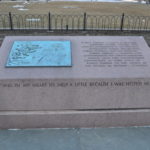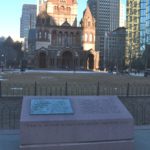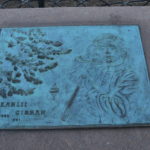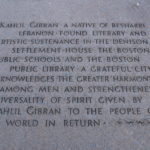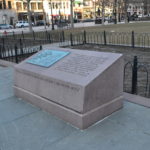
The Kahlil Gibran Memorial
Boston, MA 02116 United States
The Khalil Gibran Memorial depicts the Lebanese-born poet, philosopher, and painter in his characteristically reflective state, staring off into the distance and likely pondering one of the many weighty themes that characterized his work, including his seminal book, The Prophet (1923), which is displayed prominently in his lap. The plaque, dedicated in 1977, was designed by Gibran’s nephew, and is in part a testament to the McKim building across the street, where Gibran educated himself as a young immigrant living with his mother and siblings in Boston’s South End. “It was in my heart to help a little, because I was helped much,” the plaque reads, excerpted from a letter that accompanied Gibran’s generous bequest to the Boston Public Library.
Gibran arrived in America in 1895, at the age of 12. Though he had no formal education in Lebanon, he developed an early interest in sketches and drawings, a talent that his teachers in Boston noticed and cultivated. His teenage years were inspired by many of the city’s cultural institutions, including the theater, opera, and art galleries, and he was supported by local mentors and patrons such as avant-garde artist Fred Holland Day, headmistress Mary Elizabeth Haskell, and Lebanese painter Youssef Howayak. Following the example of his parents, who often hosted people of various backgrounds and religions in their home, Gibran became a student of the world, supplementing his Boston education with studies at the Académie Julian art school in Paris, and a Maronite-run preparatory school in Beirut, as his mother wanted to balance his Western aesthetic with his own heritage.
His work exhibits an enlightened view of spirituality and religion, an aesthetic that was embraced years later when the 1960s countercultural wave rippled across America and The Prophet became a central text of the New Age movement. Having learned first-hand about Lebanon’s bloody history and the destructive factional struggles across the Middle East, Gabrin’s work displayed a belief in the fundamental unity of religions, inviting parallels to William Blake, Walt Whitman, and Ralph Waldo Emerson. From one of his poems: “You are my brother and I love you. I love you when you prostrate yourself in your mosque, and kneel in your church and pray in your synagogue. You and I are sons of one faith—the Spirit.”
Upcoming Events
- There were no results found.
Events List Navigation
Events List Navigation
Did You Know?
Certain books were “banned in Boston” at least as far back as 1651, when one William Pynchon wrote a book criticizing Puritanism.
